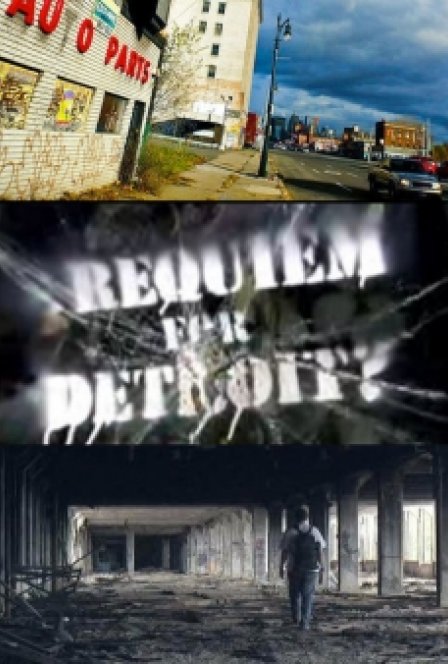Speramus Meliora; Resurget Cineribus
— Motto of the City of Detroit
Where theories on and artistic expressions of Detroit’s uniquely American, uniquely Midwestern current decay are concerned, there are generally two camps. On one side you run into a group of people who gleefully exploit the city’s catastrophic and incredibly rapid self-destruction, creating ruin-porn left and right, mining the city for every visual metaphor about the inherent perils of industrialization they can. Meanwhile, just down Cass Corridor, the other camp — referred to by many as Boosters — all but deny there’s anything wrong with Detroit whatsoever, and find tons of interesting, totally cool things going on around the city to prove it. I’ve had the pleasure of spending quite a bit of time with people who fall into each camp, and some who kind of fall into both. And what impresses me most about Julien Temple’s latest documentary, Requiem For Detroit?, is that he seems to have understood this weird dichotomy and tempers his film with an understanding of those things about Detroit that make it simultaneously awe-inspiring, tragic, and dangerous.
Temple — who most will be familiar with for the films he made documenting the punk movement in his native England and then going crazy and making Earth Girls Are Easy — spends a considerable amount of time in his latest work following an urban explorer around some of the more famous decrepit buildings that liberally pepper the city of Detroit. The film is all the better for it, as this semi-guided tour of some of the rougher and abandoned parts of the city establishes just how dire a situation Detroiters find themselves in today. Interweaving this tragic odyssey are thoughtful interviews with several people who know an incredible amount about Detroit and have given an incredible amount of themselves trying to make it a better place. Most notable among these are John Sinclair (former revolutionary and sometimes-member of the MC5) and Grace Lee Boggs, one of Detroit’s most prolific activists.
Boggs does a particularly good job in recounting the dizzying frenzy that accompanied all of the money that flowed into town during the sustained and unsustainable automobile boom, when the city devoted the majority of its resources to expanding to meet the perceived demand for new housing and new neighborhoods. A city that was built to suit the needs of a bustling 1.2 million people, Detroit’s population as of the 2010 census is now just a tick over 700k. There isn’t enough of a tax base to support the old infrastructure, and parts of the city are being allowed to revert back to natural prairie. As Boggs sees it, “The auto industry has come to the end of the line. I love to drive, but to think that [cars] are the answer to civilization and the evolution of humanity is childish. To get so excited about a few decades of mass production and to believe that that’s heaven — I mean, that’s crazy.” Yet interviews Temple conducts with some heavy hitters from Detroit’s Big Three automakers suggest that within the car lies Detroit’s great renewal. It’s kind of depressing to see the auto execs’ weirdly sad grins as they essentially justify not paying state taxes for the supposed services their offering to the people of Detroit.
Written by Jesuit Fr. Gabriel Richard after a fire in 1805 completely levelled the city, the motto of Detroit (“We hope for better things; it will arise from the ashes”) has somehow been perennially relevant for this gateway to the American North. Detroit’s in rough shape, having been the butt of both good and bad jokes for decades now — yet there really are plenty of cool things happening in the city, like the recently kickstarted Corktown Cinema, the Museum of Contemporary Arts Detroit, and the Heidelberg Project, whose founder, Tyree Guyton, is cautiously optimistic about the future of his beloved city. Requiem For Detroit?, even with its tacky question-marked title, is a very well-made documentary about a very complicated town in Michigan.

